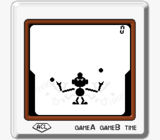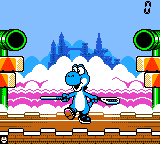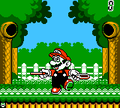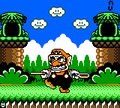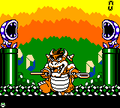Ball: Difference between revisions
m (Text replacement - "(\|[\n ]*)released([\n ]*=)" to "$1release$2") |
Tag: Mobile edit |
||
| Line 29: | Line 29: | ||
===Modern version=== | ===Modern version=== | ||
The player starts out playing as [[Yoshi]] (depicted as a [[Yoshi (species)|Light Blue Yoshi]] in the [[Game Boy Color]] version), but as they collect more stars, they can later play as [[Mario]], then as [[Wario]], and finally as [[Bowser|King Koopa]] (who is represented by a ''K'' instead of a ''B''), each more difficult than the last. The first mode has Yoshi juggling [[Yoshi's Egg|Yoshi Egg]]s. The Mario mode has the player juggling a [[Super Star|Star]], a [[Super Mushroom]], and a [[Heart (item)|heart]], actually just like ''Mario the Juggler'' but with the Super Mushroom added. These items have varying arcs of flight as opposed to the fixed patterns of the eggs. The heart is also worth only two points as opposed to three. Wario's mode gives the player the same heart, the same Star, and a [[Wanderin' Goom]] to juggle. The objects have varying arcs of flight, and the Goom will occasionally fly offscreen. King Koopa's mode features a [[Koopa Shell]], a [[Boo|Boo Buddy]], and a [[Goomba]] to keep aloft. Like the Wanderin' Goom, the Goomba and shell will sometimes fly offscreen. The Boo Buddy will also occasionally stop while traveling across its arc. Like the heart, the Goomba and shell are worth only two points apiece. | [[File:Ball_(Modern,_Yoshi).png|thumb|left|The Modern version of ''Ball'' (Yoshi variant)]] | ||
The player starts out playing as [[Yoshi]] (depicted as a [[Yoshi (species)|Light Blue Yoshi]] in the [[Game Boy Color]] version), but as they collect more stars, they can later play as [[Mario]], then as [[Wario]], and finally as [[Bowser|King Koopa]] (who is represented by a ''K'' instead of a ''B''), each more difficult than the last. The first mode has Yoshi juggling [[Yoshi's Egg|Yoshi Egg]]s. The Mario mode has the player juggling a [[Super Star|Star]], a [[Super Mushroom]], and a [[Heart (item)|heart]], actually just like ''Mario the Juggler'' but with the Super Mushroom added. These items have varying arcs of flight as opposed to the fixed patterns of the eggs. The heart is also worth only two points as opposed to three. Wario's mode gives the player the same heart, the same Star, and a [[Wanderin' Goom]] to juggle. The objects have varying arcs of flight, and the Goom will occasionally fly offscreen. King Koopa's mode features a [[shell|Koopa Shell]], a [[Boo|Boo Buddy]], and a [[Goomba]] to keep aloft. Like the Wanderin' Goom, the Goomba and shell will sometimes fly offscreen. The Boo Buddy will also occasionally stop while traveling across its arc. Like the heart, the Goomba and shell are worth only two points apiece. | |||
The Yoshi and King Koopa variants of the Modern version of ''Ball'' have [[Bob-omb]]s that sometimes fly down from the sky, while the Mario variant has [[fireball]]s and the Wario variant has [[Spike Ball|Spiked Balls]]. If a Bob-omb, fireball, or Spiked Ball hits one of the paddles, it will cause a Game Over too. At 100 points for Yoshi, 200 points for Mario, 300 points for Wario, and 400 points for King Koopa, [[coin]]s will rain down from the sky. Touching the coins with the paddles rewards the player with bonus points. By getting all of the coins, the player receives a 20-point bonus as well. | The Yoshi and King Koopa variants of the Modern version of ''Ball'' have [[Bob-omb]]s that sometimes fly down from the sky, while the Mario variant has [[fireball]]s and the Wario variant has [[Spike Ball|Spiked Balls]]. If a Bob-omb, fireball, or Spiked Ball hits one of the paddles, it will cause a Game Over too. At 100 points for Yoshi, 200 points for Mario, 300 points for Wario, and 400 points for King Koopa, [[coin]]s will rain down from the sky. Touching the coins with the paddles rewards the player with bonus points. By getting all of the coins, the player receives a 20-point bonus as well. | ||
| Line 36: | Line 37: | ||
<gallery> | <gallery> | ||
File:Ball_(Modern,_Mario).png|The Modern version of ''Ball'' (Mario variant) | File:Ball_(Modern,_Mario).png|The Modern version of ''Ball'' (Mario variant) | ||
File:Ball_(Modern,_Wario).png|The Modern version of ''Ball'' (Wario variant) | File:Ball_(Modern,_Wario).png|The Modern version of ''Ball'' (Wario variant) | ||
Revision as of 14:39, May 16, 2022
- This article is about the Game & Watch game. For other uses of the term "Ball", see Ball (disambiguation).
| Ball | |||||
|---|---|---|---|---|---|
| File:Ball-G'nW.png | |||||
| Developer | Nintendo R&D 1 | ||||
| Publisher | Nintendo | ||||
| Platform(s) | Game & Watch, Nintendo DSi, Nintendo 3DS | ||||
| Release date | Game & Watch: Template:Release Nintendo DSi (DSiWare): Template:Release Club Nintendo reissue: 2010 Nintendo 3DS (eShop): Template:Release[?] | ||||
| Genre | Puzzle | ||||
| Rating(s) |
| ||||
| Mode(s) | Single player | ||||
| Input | Game & Watch:
Nintendo 3DS:
| ||||
Ball is a Game & Watch game that was released as part of the Silver series on April 28, 1980. It was the very first game of the Game & Watch series.[1] It is one of the games in the Gallery Corner in the original Game & Watch Gallery. It is also an unlockable minigame in Game & Watch Gallery 2, which includes an updated "Modern" version of the game. Depending on the publisher, the game has gone by other names as well, including Juggle and Toss-Up.
In Game & Watch Gallery 2, the player starts out with only the Classic version of Ball (unlike most Game & Watch games in the Game & Watch Gallery series). In order to unlock the Modern version, they would first have to either obtain five stars on both modes in the Classic version or possess a star count of 25 or more. Easy Mode seems to be like Game A, while Hard Mode is Game B.
This Game & Watch was later reworked into the Mario-themed Mario the Juggler; this remake was the last Game & Watch title produced (not counting Parachute × Octopus released nearly 10 years later).[2]
A reissue was made available on the Club Nintendo rewards program for 1,200 coins in 2010.[3]
Gameplay
Classic version
The player controls the hands of a doll with the goal of juggling balls for as long as possible.[4] If one ball breaks, it is Game Over. Game A has two balls to juggle (one point per catch), while Game B has three balls (10 points per catch). This has, unlike the other Game & Watch games, one chance to play, before a Game Over.
Modern version
The player starts out playing as Yoshi (depicted as a Light Blue Yoshi in the Game Boy Color version), but as they collect more stars, they can later play as Mario, then as Wario, and finally as King Koopa (who is represented by a K instead of a B), each more difficult than the last. The first mode has Yoshi juggling Yoshi Eggs. The Mario mode has the player juggling a Star, a Super Mushroom, and a heart, actually just like Mario the Juggler but with the Super Mushroom added. These items have varying arcs of flight as opposed to the fixed patterns of the eggs. The heart is also worth only two points as opposed to three. Wario's mode gives the player the same heart, the same Star, and a Wanderin' Goom to juggle. The objects have varying arcs of flight, and the Goom will occasionally fly offscreen. King Koopa's mode features a Koopa Shell, a Boo Buddy, and a Goomba to keep aloft. Like the Wanderin' Goom, the Goomba and shell will sometimes fly offscreen. The Boo Buddy will also occasionally stop while traveling across its arc. Like the heart, the Goomba and shell are worth only two points apiece.
The Yoshi and King Koopa variants of the Modern version of Ball have Bob-ombs that sometimes fly down from the sky, while the Mario variant has fireballs and the Wario variant has Spiked Balls. If a Bob-omb, fireball, or Spiked Ball hits one of the paddles, it will cause a Game Over too. At 100 points for Yoshi, 200 points for Mario, 300 points for Wario, and 400 points for King Koopa, coins will rain down from the sky. Touching the coins with the paddles rewards the player with bonus points. By getting all of the coins, the player receives a 20-point bonus as well.
Unlike in the Classic version, music is featured, with the tempo changing depending on the speed of the game.
Controls
(left and right): Move
: Move left
: Move right
Appearances in other games
Ball appears as a microgame called Game & Watch Toss Up in WarioWare: Touched! and another called Ball in Game & Wario.
Ball was remade for DSiWare. It was released on July 15, 2009, in Japan; April 19, 2010, in North America; and April 23, 2010, in Europe and Australia.
A Mario-themed version of Ball was included in Game & Watch: Super Mario Bros., which replaces the main character with Mario or Luigi.
Gallery
Screenshots
- Game and Watch Ball 1 (DSiWare).jpg
Another screenshot of the DSiWare version of Ball
- Game and Watch Ball 3 (DSiWare).jpg
Yet another screenshot
Sprites
Warp Pipe (Yoshi variant)
Media
Names in other languages
| Language | Name | Meaning | Notes |
|---|---|---|---|
| Chinese | 抛接球[5] Pāo Jiē Qiú |
Throw Catch Ball |
Trivia
- This game can also be played in Game & Watch Gallery 2, along with the Game Boy Camera, with the player's face instead of the juggler's.
- This game is the only Game & Watch game remade after the Game Boy was released.
- One of the tips for this game is inaccurate; Toad tells the player they have to catch the characters (the characters being Bob-ombs) and avoid the coins, when it is actually the other way around. This may have been an error in translation; the tip is accurate in the Japanese version.
- In Game & Watch Gallery 2, Princess Peach was planned to be one of the playable characters in Modern Mode, with most of her graphical data still intact. In her variation, she was going to juggle cookies like those seen in Yoshi's Cookie.[6]
- Mr. Game & Watch's throws in the Super Smash Bros. series have him juggle his opponents and toss them in different directions.
External links
References
- ^ Ball info page on In The Attic, a website dedicated to classic videogames Retrieved 13 November 2010
- ^ Mario the Juggler info page on In The Attic, discussing its Ball-basis Retrieved 13 November 2010
- ^ [1]
- ^ Ball instruction booklet, page 4.
- ^ From the iQue DSiWare release
- ^ https://tcrf.net/Game_%26_Watch_Gallery_2#Ball
| Game & Watch games | ||
|---|---|---|
| Super Mario franchise | Donkey Kong (1982, MS) • Mario Bros. (1983, MS) • Mario's Cement Factory (1983, TT/NWS) • Mario's Bombs Away (1983, PS) • Donkey Kong Hockey (1984, MVS) • Super Mario Bros. (1986, CrS | 1987, Sp | 1988, NWS) • Mario the Juggler (1991, NWS) • Game & Watch: Super Mario Bros. (2020, CoS) | |
| Donkey Kong franchise | Donkey Kong (1982, MS) • Donkey Kong Jr. (1982, NWS | 1983, TT & PS) • Donkey Kong II (1983, MS) • Donkey Kong 3 (1984, MVS) • Donkey Kong Circus (1984, PS) • Donkey Kong Hockey (1984, MVS) | |
| Miscellaneous | Green House (1982, MS) | |
| MS: Multi Screen • TT: Table Top • PS: Panorama Screen • NWS: New Wide Screen • MVS: Micro VS. System • CrS: Crystal Screen • Sp: Special • CoS: Color Screen | ||
